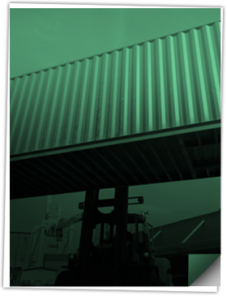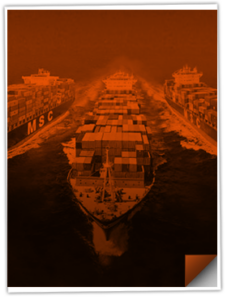Featured Headlines:
Aluminum Reaches First Base in ACE
CBP Releases Hearty Fiber on Cyber
Intermodal Rail Anecdotal Tale
Aluminum Reaches First Base in ACE
- U.S. Customs and Border Protection (CBP) deployed Phase 1 of the “Apply Aluminum 232 Duty to Russian Smelt or Cast Enhancement” within the Automated Commercial Environment (ACE) Production Environment on April 10.
- According to CBP officials, the trade community will not be impacted by the enhancement until it officially goes into effect on May 10—except for filers attempting to report data on the 54-record, Type=07. Those filers will receive an error message “F777 error – ADDTL DEC TYPE NPT YET EFF OR EXPIRED.”
- For any questions, concerns or comments, please contact CBP’s Entry Summary Accounts & Revenue Division (ESAR) at [email protected].
- To learn more about the recent changes to Section 232 duties, check out our ShapFlash.
CBP Releases Hearty Fiber on Cyber
- Earlier this week, CBP released new guidance on cyber-related incidents for customs brokers to help support the agency’s ongoing efforts to educate both industry and government parties on the processes, procedures, and responsibilities regarding man-made supply chain disruptions.
- The guidance includes a best practices document on how to prepare for and respond to a cyber-attack; it also makes recommendations on how to prevent, respond to and recover from potential cyber-attacks on customs broker data systems.
- In addition to the Cyber Incident Guidance for Customs Brokers, CBP officials are also developing more detailed cyber-attack guidance that will be shared at a later date.
- Click here to read the full update (CSMS #55845515).
- Any questions? Feel free to reach out to our compliance experts!
Intermodal Rail Anecdotal Tale
- The US Surface Transportation Board (STB) reported that intermodal rail cargo arriving on-time or less than 24 hours late has increased by 10% year-over-year (YoY) for Q1 2023. Yes, US intermodal train service is more than a day late 90% of the time; THAT is what the STB means. Easy does it, just joshin’!
- With average train speeds up 4% and US ports largely cleared of cargo congestion (while still choked with political tension), shippers can reasonably expect service and performance enhancements from the railroads…Right?
- Those clever folks at the Journal of Commerce (JOC) publish an Intermodal Service Scorecard, which combines shipper surveys with available railroad performance data. While most shippers have witnessed intermodal improvements, almost 60% named the Union Pacific (UP) as the worst-performing railroad. For shame!
- It must be because shippers are mean-spirited, right? Not exactly. In Q1, the UP’s on-time execution fell 8%, despite the largely favorable supply chain conditions overall.
- With Norfolk Southern already standing in the corner wearing a special hat, it looks like the teacher will need to clear a space caddy-corner for the UP. Frankly speaking, the UP did face some of the nastiest March weather out west in recent memory!
- So…which railroad brings an apple for the teacher and pleases the most shippers? Well, 58% of respondents in the JOC survey say, “CSX, that’s who!” And, nobody says, “Chessie Seaboard X”—CSX’s full name—complete with a multiplication sign!
Discretionary Cargo Tempo
- Cornell University reminds us that “discretionary cargo” is a term used to describe cargo arriving in a different port of unloading than its ultimate port of entry. This is the mysterious-sounding cargo often circumventing Los Angeles today to avoid possible picket lines.
- This cargo also frequently travels long distances after arrival and lends itself to intermodal rail solutions. East Coast ports know this already!
- While total rail transits are typically longer than trucks, the Port Authority of New York and New Jersey (PANYNJ) has noted that railcars get-a-move-on in 36 hours on average. Trucks need 84 hours to assemble the perfect outfit, get their make-up perfect, and get those accessories just right! Thus, if our math is correct, it takes trucks 57% longer to get moving.
- With a two-day head start out of the gate (literally!), intermodal rail can give trucks a run for their money (also literally!). And, let’s face it, rail moves are better for port congestion and the environment.
- The Port of Virginia may be leading the race to attract discretionary cargo. After scoring the only East Coast direct intermodal connection to Memphis, among other key connections, Norfolk has witnessed a 12% growth in rail lifts, with intermodal playing a part in one-third of all port moves in 2022.
- The Port of Baltimore—which has been talking about double-stacking rail containers since before the era of containerization itself (ha…ha)—is poised to add on-dock rail capabilities while (gassssssp) finally raising the height of that ____ing tunnel to allow CSX to double-stack containers!
- Last week, New Jersey’s Department of Transportation awarded a $6 million grant for the construction of new crossover tracks for the PANYNJ’s ExpressRail facility in Elizabeth. These crossover tracks will allow trains originating from the port complex’s two largest container terminals to connect directly with southbound tracks adjacent to the facilities.
- What do those pesky Canadians have to say on the subject? Well, St. John in New Brunswick is adding two post-Panamax cranes this spring to serve larger trans-Pacific vessels. From there, Canadian Pacific can effectively reach the US Midwest.
No Hidin’ from Biden
- Underscoring the direct connection between a focus on worldwide human rights and President Biden’s foreign policy, the White House and US Department of Commerce’s Bureau of Industry and Security (BIS) released the Export Controls and Human Rights Initiative (ECHRI) Code of Conduct.
- Essentially, the Code of Conduct strives to counter the misuse of technology, software, and goods that enable human rights abuses. In the increasingly complex global supply chain, export controls provide the best pathway to control and limit these misuses.
- The US has endorsed the initiative in concert with 23 other nations—though the Swedes could not be bothered. We can’t tell you what to do, gentle reader…but we are boycotting the purchase of Swedish Fish (the candy, not pike or perch!).
- While participation is currently non-binding and voluntary, the program has offered quite a lot of structure; and suggests the following approaches:
- Tighten reviews for exports of dual-use goods, technologies, and software to best ascertain potential uses for human rights abuses.
- Build in-country communication channels between exporters, the private sector, civil society, and academia.
- Broaden and deepen communication channels with other countries as innovative threats and risks emerge.
- Share best practices with all participating countries as export controls improve.
- Encourage more countries to subscribe to the Code of Conduct. That means YOU, Sweden!
- For more information about the ECHRI, check out check out the White House Fact Sheet.
Global Grab Bag
- OOCL, now a part of COSCO, revealed a 58% year-over-year (YoY) decline in revenue for Q1 2023. We all see and feel the broader ocean freight rate correction—but OOCL saw the average freight rate on its Q1 liftings plummet to $1,252 per twenty-foot equivalent unit (TEU), compared to $2,873 per TEU in Q1 2022. Ouch!
- While OOCL has shifted commercial focus to intra-Asia and Australasia, 25% of the carrier’s business still travels the transpacific, and the revenue for that trade lane plunged an excruciating 66%. Double ouch!
- As cocky ports like New York and Los Angeles boldly boast about ridding themselves of huge backlogs of empty containers while in the US seaport locker room, concerned voices can be heard coming from the colorful locker rooms of Chinese ports.
- A lull in export volumes from China and greater Asia has led to an imbalance of empties since the rate of filling and shipping full boxes has waned considerably.
- Industry analysts estimate that container depots are at least 90% full, with a much higher than usual percentage of property being utilized to store empty containers. Should these depots overflow, ports will be forced to lease new property or redesign on-port land usage. This is costly, inefficient, and sometimes even dangerous. Triple ouch!
- MSC and CMA CGM have announced the improvement of their joint Australia Express Service (AEX) / NEMO service, with a direct call at Ennore (Chennai) on the westbound leg to be introduced in June 2023.
- Sometimes the sheer scope and geographical breadth of our industry is breathtaking! Check out the rotation on this bad boy; it touches 13 countries and takes more than three months to complete a full circuit:
- Ennore (India) – Colombo (Sri Lanka) – Gioia Tauro (Italy) – Valencia (Spain) – London Gateway (England) – Rotterdam (Netherlands) – Hamburg (Germany) – Antwerp (Belgium) – Le Havre (France) – Fos Sur Mer (France) – La Spezia (Italy) – Gioia Tauro (Italy) – Pointe De Galets (Island of Reunion) – Port Louis (Mauritius) – Sydney (Australia) – Melbourne (Australia) – Adelaide (Australia) – Fremantle (Australia) – Singapore – Ennore (India).
ILWU Strikes a Pose
- Stating that a meeting to elect a new local union leader was a “contractual right” and something about Good Friday being a holiday, Los Angeles’ lucky local 13 of the International Longshore and Warehouse Union (ILWU) ceased port operations for the night of April 6 and all-day on April 7.
- The Pacific Maritime Association (PMA) grumbled (though anonymously) that Thursday’s meeting wasn’t legit and Good Friday is not an official holiday.
- Oh goodie…it sure sounds like these two lovebirds are getting ready to tie the knot and live happily ever after in a perfect state of eternal bliss… and stuff!
- Well, thank goodness, it’s not like local 13 delayed the dispatch of their crews on the morning of Monday, April 10! Wait…. actually, that is exactly what happened!
- Then why aren’t shippers worried about a strike? Nearly 250 companies and trade groups—primarily from the retail and transportation sectors—continue to pressure the Biden Administration to intervene to achieve peace in the San Fernando Valley. That’s quite a few worrywarts with plenty of clout, including the National Retail Federation (NRF)!
- The ILWU must be striking this pose while the iron is hot, right? Over 60% of Asian imports transited West Coast ports when negotiations started last May, and that number has shrunk to about 53% today. That iron isn’t cold, but it is cooling.
- How does the friendly American farmer/exporter in the West feel about all of this? Grumpy, that’s how… Not only do transportation costs rise when the ILWU supports fewer weekly shifts, but ocean carriers’ blank sailings deteriorate sailing schedule integrity.
- The cherry on top is that, with the threat of a strike looming, international buyers have good reason to source elsewhere. When you are selling soybeans or wheat, you don’t get a lot of value in each container—and who’s going to pay for the emergency dray to Vancouver or Houston?
- Interestingly, the ILWU’s case for Terminal 5 in Seattle may in fact be “terminal.” The US National Labor Relations Board (NLRB) has sided with terminal owner, SSA Marine, in this infamous jurisdictional dispute over 20 machinists. The NLRB went so far as to indicate that the ILWU had “engaged in unfair labor practices.”
- As you scholarly readers know, the Terminal 5 dispute has been the epicenter of negotiation delays between the PMA and the ILWU.
- Shockingly, the ILWU intends to dispute the NLRB ruling in court—which could postpone a final resolution by years. That said, it does make us wonder if the Terminal 5 aspect may at least be diminished in the larger debates between the ILWU and the PMA.
- Never miss an important update like this again—visit our Subscription Center today to sign-up for our complimentary ShapFlash news alerts!
Rappin’ on Today’s Hyundai
- Hyundai (accurately pronounced HYUN-day in two syllables) can’t gainsay the hearsay about moving down Broadway to the fairway to the private way!
- After Hanjin, it was all doomsday, carrier cliché, credit dismay, a fear display, the political array, and nothing was child’s play.
- Times have changed, and Hyundai has now hired Samsung Securities to find the right buyer of the South Korean government’s 45% stake in the world’s 8th largest carrier.
- Standing as the only ocean carrier to have grown in Q4 2022 (by an impressive 8%) and with an orderbook that represents 33% of current capacity, Hyundai looks hungry to grow market-share.
- Interestingly, after THE Alliance announced plans to cancel the PS8 loop in May, Hyundai has stepped in to run that service as the Pacific South Express (PSX). What other moves will this plucky carrier pull out of her bag of tricks in 2023 and beyond?



